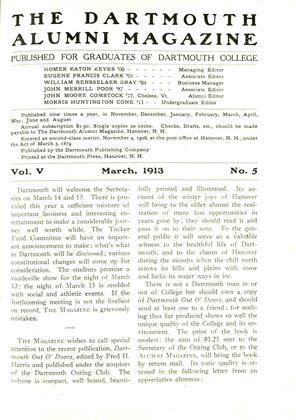Statistics recently compiled by the Registrar show a most encouraging improvement in the scholarship standing of the undergraduates at the opening of the second semester this year as compared with that at the same time last year. As must always be the case in an institution where boys are just turning the corner into manhood, where many have not yet put aside the garments of idleness, indifference, and neglect for the more protective cloak of responsibility, the blasts of monthly quizzes and final examinations have frozen a goodly number of wayfarers, but the percentage of those dropping by the roadside this year is noticeably smaller than that of a year ago.
There is small chance for error in the figures as presented, for their compilation has been made in exactly the same way for 1911-1913 as. for 1911-1912, the numbers in the respective classes being about equal for the two years. The results a re these: At the opening of the second semester in 1912-1913, there are only one-fourth as many juniors under disciplinary action as at the same time in 1911-1912, only one-half as many sophomores, and only three-fourths as many freshmen; moreover, only three-fourths as many freshmen were separated from College for deficiency in scholarship this year as last. The total enrollment of the four undergraduate classes at the opening of the second semester this year was 1157, as against 1122 at the same time in 1911-1912. This shows a gain of thirty-five, — a most cheering fact, when it is remembered that there were but nine more men enrolled at the beginning of the first semester this year than at the opening of the year 1911-1912. Furthermore, the enrollment for this semester is larger than any previous second semester enrollment in the history of the College.
The least radical conclusion that can be drawn from these statistics, is one of hopeful outlook: the, average student is finally realizing that he must meet at least the minimum conditions for his work, if he would remain in College, and he is proving that he can meet these conditions. His ability is probably no greater than that of his unfortunate brothers of the past, but it has been aroused and spurred on by his realization of the necessity of personal responsibility in the matter of studies, and by his better adjustment to the environment in which he works. The immediate causes of such realization and such adjustment can only be conjectured, but it would be safe to hazard that a now well-established system of faculty advisers and a smoother, less distracting fraternity situation are not among the least of these.
 View Full Issue
View Full Issue
More From This Issue
-
 Article
ArticleTHE LITERARY TRAIL AT DARTMOUTH
March 1913 By Emeritus Charles Francis Richardson -
 Article
ArticleDartmouth will welcome the Secretaries on March 14 and 15.
March 1913 -
 Class Notes
Class NotesCHICAGO ASSOCIATION
March 1913 By WM. H. GARDINER '76 -
 Class Notes
Class NotesLOCAL ASSOCIATIONS
March 1913 -
 Class Notes
Class NotesCLASS OF 1878
March 1913 By William D. Parkinson -
 Class Notes
Class NotesCLASS SECRETARIES
March 1913
Article
-
 Article
ArticleSOME INTERESTING GIFTS
November, 1915 -
 Article
ArticleHOLD SERIES OF DARTMOUTH LUNCHEONS IN BOSTON
April 1920 -
 Article
ArticleFootball Scholarship
JANUARY 1932 -
 Article
ArticleReynolds Scholarships Available to Alumni
February 1954 -
 Article
Article1965 Fund Pulls Ahead
JUNE 1965 -
 Article
ArticleThe Undergraduate Chail
OCTOBER 1969 By WIN ROCKWELL '70


